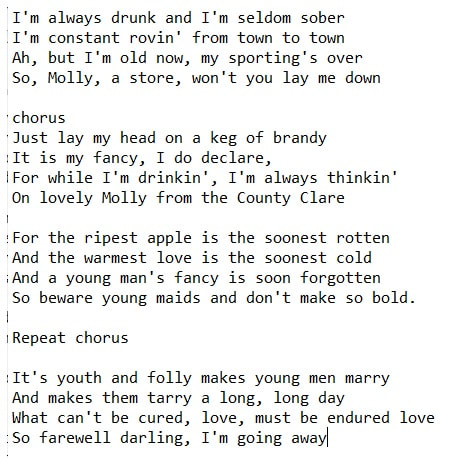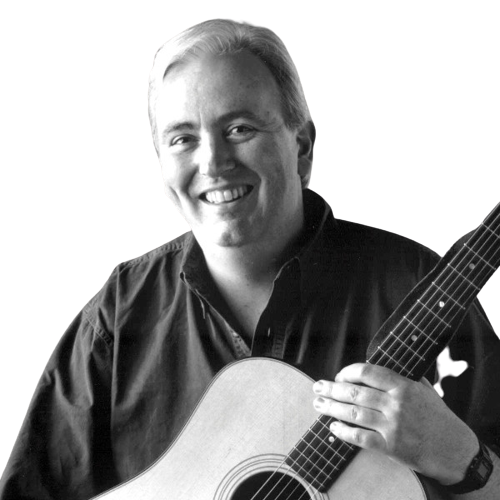Keg Of Brandy Lyrics And Guitar Chords
Keg Of Brandy is an old traditional song from the 1700's. It was re-written by Robbie O'Connell who put his own tune to it. It was also recorded by Navigators who play it in the key of A. The first version is by Robbie O'Connell. It was recently recorded by The High Kings and Cherish The Ladies. The High Kings recently covered one of the top ten songs on the site '' Grace '' which has now being recorded by a rake of folk and popular singers, especially since the 1916 centenary.
Here is the chords that Robbie O'Connell uses.
Intro C, Em, Am, Em, F, G, C
[C]I'm always [Am]drunk [G]and I'm seldom [F]sober
A [G]constant [Am]roving from [Em]town to town
Ah but I'm [Am]old now, [G]my sporting's [F]over
So Molly, a [Am]stór, won't you [C]lay me [F]down?
Chorus
[C]Just [Em]lay my [Am]head [G]on a keg of br[F]andy
It [G]is my [Am]fancy, I [G]do [F]declare
For [C]while I'm drinking, I'm [Em]always think[F]ing
On lovely [Am]Molly from the [G]County [F]Clare
G, C, Em, Am, Em, F, G, C
The [F]ripest apple [G]is the soonest [F]rotten
And [Am]the warmest love is the [Em]soonest cold
And a young man's [F]fancies are [Em]soon for[F]gotten
[Am]Beware, young maids, and [G]don't make [F]so bold
Repeat chorus
G, C, Em, Am, Em, F, G, C
[C]For it's youth and [Am]fol[G]ly make [F]young men marry
And makes them [Am]tarry a[Em]long the day
What can't be [F]cured, love, [G]must be en[F]dured, love
So farewell, [Am]darling, [G]I'm going a[F]way
Intro C, Em, Am, Em, F, G, C
[C]I'm always [Am]drunk [G]and I'm seldom [F]sober
A [G]constant [Am]roving from [Em]town to town
Ah but I'm [Am]old now, [G]my sporting's [F]over
So Molly, a [Am]stór, won't you [C]lay me [F]down?
Chorus
[C]Just [Em]lay my [Am]head [G]on a keg of br[F]andy
It [G]is my [Am]fancy, I [G]do [F]declare
For [C]while I'm drinking, I'm [Em]always think[F]ing
On lovely [Am]Molly from the [G]County [F]Clare
G, C, Em, Am, Em, F, G, C
The [F]ripest apple [G]is the soonest [F]rotten
And [Am]the warmest love is the [Em]soonest cold
And a young man's [F]fancies are [Em]soon for[F]gotten
[Am]Beware, young maids, and [G]don't make [F]so bold
Repeat chorus
G, C, Em, Am, Em, F, G, C
[C]For it's youth and [Am]fol[G]ly make [F]young men marry
And makes them [Am]tarry a[Em]long the day
What can't be [F]cured, love, [G]must be en[F]dured, love
So farewell, [Am]darling, [G]I'm going a[F]way
Below is another version in case the other chords don't suit.
[Am]I'm always [C]drunk and [D]I'm seldom [Em]sober
[D]I'm constant [G]rovin' from town to town
Ah, but I'm [C]old now, [D]my sporting's [Em]over
[D]So, Molly, a [C]store, won't you [D]lay me [Em]down
chorus
[G]Just lay my [C]head on a [D]keg of [Em]brandy
It [G]is my fancy, I do [C]declare,[D]
[G]For while I'm drinkin', I'm always [C]thinkin'
[Am]On lovely [Em]Molly from the [C]County [G]Clare
[G]For the ripest [C]apple is the [D]soonest [Em]rotten
And the [D]warmest [G]love is the soonest cold
And a young man's [C]fancy is [Em]soon for[Em]gotten
So [D]beware young [C]maids and [D]don't make so [Em]bold.
Repeat chorus
It's [C]youth and folly makes [D]young men [Em]marry
And [D]makes them [G]tarry a long, long day
What can't be [C]cured, love, [D]must be en[Em]dured love
So [D]farewell [C]darling, I'm [D]going a[Em]way
[Am]I'm always [C]drunk and [D]I'm seldom [Em]sober
[D]I'm constant [G]rovin' from town to town
Ah, but I'm [C]old now, [D]my sporting's [Em]over
[D]So, Molly, a [C]store, won't you [D]lay me [Em]down
chorus
[G]Just lay my [C]head on a [D]keg of [Em]brandy
It [G]is my fancy, I do [C]declare,[D]
[G]For while I'm drinkin', I'm always [C]thinkin'
[Am]On lovely [Em]Molly from the [C]County [G]Clare
[G]For the ripest [C]apple is the [D]soonest [Em]rotten
And the [D]warmest [G]love is the soonest cold
And a young man's [C]fancy is [Em]soon for[Em]gotten
So [D]beware young [C]maids and [D]don't make so [Em]bold.
Repeat chorus
It's [C]youth and folly makes [D]young men [Em]marry
And [D]makes them [G]tarry a long, long day
What can't be [C]cured, love, [D]must be en[Em]dured love
So [D]farewell [C]darling, I'm [D]going a[Em]way
Robbie O'Connell is a renowned Irish singer, songwriter, and guitarist who has made a significant impact on the traditional Irish music scene. With a career spanning over four decades, O'Connell has become a household name in the Irish music community, known for his soulful voice, skilled guitar playing, and captivating stage presence. In this thesis, I will delve into O'Connell's musical journey, his contributions to traditional Irish music, and his impact on the genre.
Born in Waterford, Ireland, in 1944, O'Connell was raised in a musical family, with both his parents being accomplished musicians. He began playing the guitar at a young age and was heavily influenced by the traditional Irish music he grew up listening to. In the 1960s, O'Connell joined the Irish folk group 'The Clancy Brothers and Tommy Makem,' where he honed his skills as a performer. This experience laid the foundation for his future musical endeavors and solidified his passion for Irish music.
In the 1970s, O'Connell moved to the United States, where he continued to pursue his musical career. He became a member of the iconic Irish-American folk group 'The Green Fields of America,' led by legendary musician Mick Moloney. O'Connell's unique blend of traditional Irish music with American folk and country influences set him apart from other Irish musicians, making him a standout in the industry. He also released his solo albums, which received critical acclaim and helped establish him as a solo artist.
One of O'Connell's most significant contributions to traditional Irish music is his role in the revival of sean nós singing. Sean nós, which translates to 'old-style,' is a traditional form of unaccompanied Irish singing that dates back centuries. O'Connell's effortless and authentic rendition of sean nós songs has brought this art form to a wider audience, making it more accessible and preserving it for future generations. His mastery of this style of singing has earned him numerous accolades, including the prestigious 'Sean-Nós Cois Life' award.
Aside from sean nós, O'Connell's repertoire also includes a wide range of traditional Irish songs, as well as his own original compositions. His ability to infuse his personal touch into traditional songs while still honoring their roots has made him a beloved figure in the Irish music community. O'Connell's songs often reflect his Irish heritage, with themes of love, loss, and nostalgia, making them relatable to audiences worldwide.
O'Connell's impact on traditional Irish music extends beyond his musical contributions. He has also been instrumental in mentoring and nurturing young Irish musicians, passing on his knowledge and expertise to the next generation. He has taught at various music festivals and workshops, both in Ireland and the United States, and has inspired many up-and-coming artists to pursue a career in Irish music.
In addition to his solo career, O'Connell has collaborated with various renowned musicians, such as Eileen Ivers, Andy Irvine, and Liam Clancy. He has also shared the stage with some of the biggest names in the music industry, such as Bob Dylan, Tom Paxton, and Emmylou Harris. O'Connell's versatility and ability to collaborate with musicians from different genres have expanded the reach of traditional Irish music, exposing it to new audiences and keeping it relevant in the ever-evolving music landscape.
In conclusion, Robbie O'Connell's musical journey is a testament to his unwavering dedication to traditional Irish music. His unique blend of traditional and contemporary styles, his commitment to preserving sean nós singing, and his mentorship of young musicians have made him a pivotal figure in the Irish music scene. O'Connell's impact on traditional Irish music will continue to be felt for generations to come, and his contributions to the genre will undoubtedly leave a lasting legacy.
Born in Waterford, Ireland, in 1944, O'Connell was raised in a musical family, with both his parents being accomplished musicians. He began playing the guitar at a young age and was heavily influenced by the traditional Irish music he grew up listening to. In the 1960s, O'Connell joined the Irish folk group 'The Clancy Brothers and Tommy Makem,' where he honed his skills as a performer. This experience laid the foundation for his future musical endeavors and solidified his passion for Irish music.
In the 1970s, O'Connell moved to the United States, where he continued to pursue his musical career. He became a member of the iconic Irish-American folk group 'The Green Fields of America,' led by legendary musician Mick Moloney. O'Connell's unique blend of traditional Irish music with American folk and country influences set him apart from other Irish musicians, making him a standout in the industry. He also released his solo albums, which received critical acclaim and helped establish him as a solo artist.
One of O'Connell's most significant contributions to traditional Irish music is his role in the revival of sean nós singing. Sean nós, which translates to 'old-style,' is a traditional form of unaccompanied Irish singing that dates back centuries. O'Connell's effortless and authentic rendition of sean nós songs has brought this art form to a wider audience, making it more accessible and preserving it for future generations. His mastery of this style of singing has earned him numerous accolades, including the prestigious 'Sean-Nós Cois Life' award.
Aside from sean nós, O'Connell's repertoire also includes a wide range of traditional Irish songs, as well as his own original compositions. His ability to infuse his personal touch into traditional songs while still honoring their roots has made him a beloved figure in the Irish music community. O'Connell's songs often reflect his Irish heritage, with themes of love, loss, and nostalgia, making them relatable to audiences worldwide.
O'Connell's impact on traditional Irish music extends beyond his musical contributions. He has also been instrumental in mentoring and nurturing young Irish musicians, passing on his knowledge and expertise to the next generation. He has taught at various music festivals and workshops, both in Ireland and the United States, and has inspired many up-and-coming artists to pursue a career in Irish music.
In addition to his solo career, O'Connell has collaborated with various renowned musicians, such as Eileen Ivers, Andy Irvine, and Liam Clancy. He has also shared the stage with some of the biggest names in the music industry, such as Bob Dylan, Tom Paxton, and Emmylou Harris. O'Connell's versatility and ability to collaborate with musicians from different genres have expanded the reach of traditional Irish music, exposing it to new audiences and keeping it relevant in the ever-evolving music landscape.
In conclusion, Robbie O'Connell's musical journey is a testament to his unwavering dedication to traditional Irish music. His unique blend of traditional and contemporary styles, his commitment to preserving sean nós singing, and his mentorship of young musicians have made him a pivotal figure in the Irish music scene. O'Connell's impact on traditional Irish music will continue to be felt for generations to come, and his contributions to the genre will undoubtedly leave a lasting legacy.



